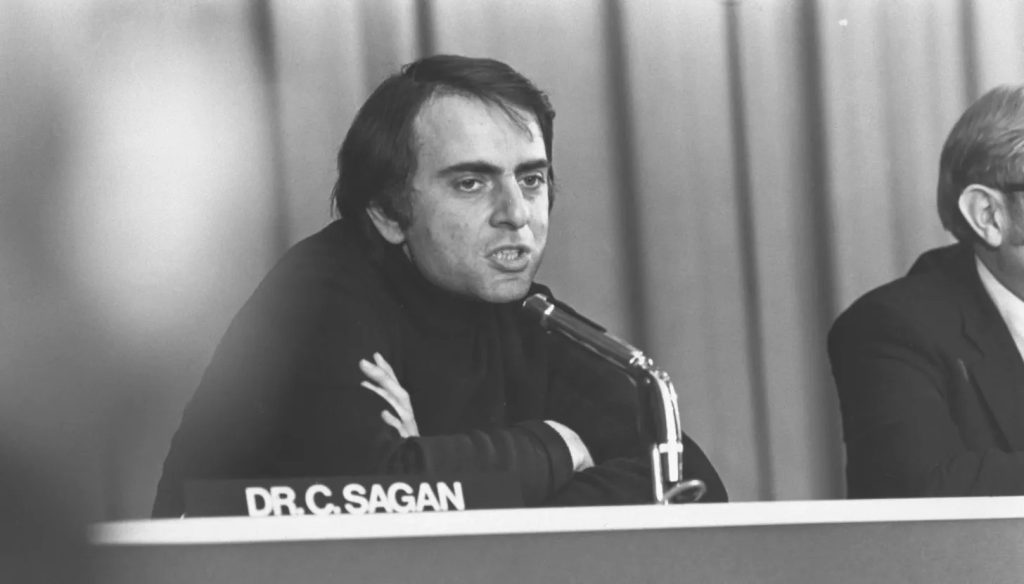Was Carl Sagan Right About
The Dumbing Down of America?
”Exploring a famous quote by Sagan and how it has played out almost 30 years later.”
by Joe Martino
I was recently reminded of a Carl Sagan quote that tells our current times. The quote comes from Sagan’s final book The Demon-Haunted World: Science as a Candle in the Dark written in 1995.
It goes like this:
“I have a foreboding of an America in my children’s or grandchildren’s time — when the United States is a service and information economy; when nearly all the manufacturing industries have slipped away to other countries; when awesome technological powers are in the hands of a very few, and no one representing the public interest can even grasp the issues; when the people have lost the ability to set their own agendas or knowledgeably question those in authority; when, clutching our crystals and nervously consulting our horoscopes, our critical faculties in decline, unable to distinguish between what feels good and what’s true, we slide, almost without noticing, back into superstition and darkness…
The dumbing down of American is most evident in the slow decay of substantive content in the enormously influential media, the 30 second sound bites (now down to 10 seconds or less), lowest common denominator programming, credulous presentations on pseudoscience and superstition, but especially a kind of celebration of ignorance”
― Carl Sagan, The Demon-Haunted World: Science as a Candle in the Dark
There are certainly some obvious truths to this observation that we see today, some of his predictions are almost creepily accurate. This quote got me thinking about the shadow and light of some of what he brings forth. I’d like to share some of those thoughts and would love to hear your feedback as well.
Perhaps even at the time he wrote this, it was easy to see that manufacturing was going to be outsourced to other countries where labor is cheap; after all, that is the incentive of capitalistic systems.
But he makes some other observations worth discussing here.
1. Sagan speaks of a future time “when awesome technological powers are in the hands of a very few.”
One could argue that technological power is in almost everyone’s hands. Billions of us have small, powerful computers in our pockets every day, and so much can be done with them, from making money to solving key problems to staying connected. Of course, there are downsides to the way we use this technology as well. We are addicted to our phones, the total nature of how we use our phones can hijack our attention and emotional state.
But the consistent question I’ve always posed when it comes to technology is important here: is the technology to blame? Or the way our consciousness stewards and uses that technology? To blame technology is to say we have no innate power to regulate ourselves, our attention, our nervous system, and our emotions, and that technology controls that for us.
On the other hand of Sagan’s observation, governments have the ability to utilize technological power for incredible control and destruction. The interplay with government, elite interests, and Big Tech companies has shown the ability to control people’s perspectives on major events. Have a look at how censorship shaped public behavior during COVID. This is truly incredible technological power in the hands of a few.
We also see the ability to destroy the world, edit genes, manufacture bioweapons, and even potentially extend life dramatically – all incredible technological powers – are currently only in the hands of an elite few. Perhaps some of this could change in the coming future, but for now it is rather obvious what moment we’re in.
2. Sagan says “[…]when the people have lost the ability to set their own agendas or knowledgeably question those in authority”
This is an interesting piece to me as I witnessed and was part of the rise of alternative media from 2009 until now.
People certainly have learned a lot about how to challenge authority through alternative media and social media, but their impact on authority seems to have certainly decreased (perhaps not?)
Governing institutions at high levels don’t generally respond to the will of the people, only that of their lobbying partners and powerful interests while decrying that “democracy is the foundation of our country.”
In this sense, people have lost the ability to set their own agendas, and in many ways, the continual difficulty of affording life in developed countries through capitalistic structures has virtually imprisoned people to their work. Perhaps ‘imprisoned’ is a strong word here, but it’s useful to note how little time there is in a day for people to truly set their own agenda when surviving becomes more and more difficult.
Mainstream media culture has done a great job of misinforming people JUST ENOUGH to move them away from challenging authority in a meaningful way, while alternative forms of media have helped, have our faculties to critically think declined? This is a tough one to answer, but I do have some thoughts.
3. “[…]Our critical faculties in decline, unable to distinguish between what feels good and what’s true”
This one connects to perhaps my greatest passion. The need for embodied sensemaking.
When I founded Collective Evolution (CE) in 2009, it was connected to a feeling that humanity had an opportunity to evolve not only the way we live in society but how we as people relate to ourselves, each other, and nature. In my eyes, our individual and collective worldview was changing in a big way, and it was all happening as increasing chaos was created from crumbling societal institutions.
As I discussed in We’re Not Living In Ordinary Times, the old ways of trying to understand or make sense of our world no longer work, and we have to address our ways of knowing. At the time of conceiving CE, I began developing a framework to explore ways of knowing and eventually refined these explorations into an idea I now call embodied sensemaking.
In the past, collective ways of knowing may have been via faith or gurus, what ‘felt good’ in a sense. In more modern times, our ways of knowing might be almost entirely cognitive, and now that way of knowing ‘feels good’.
But in either time, were humans collectively developing a deep mastery of the faculties that feed into our ways of knowing? What faculties were even acknowledged as being helpful?
Can implicit and explicit intuition feed into the cognitive picture to know more deeply?
Can we sense and feel our body’s felt sense enough to sense when our ‘feels good’ bias is coming into play?
Do we know the difference between what feels good and what feels true?
What if sensations in our body and past experiences are causing us to defend our positions to a fault?
How do we know when an internal cue is leading us in a direction toward truth and knowing vs. confirmation bias?
These are tough questions to answer and are certainly worthy of consideration when you take a look at what’s happening with individual and collective sensemaking.
I have a strong feeling that humans have many faculties available to us in our exploration of knowing or sensemaking, and that the next stages of our cultural evolution will embrace them. But are we currently attuned to them?
Without getting into all the specifics of our brain, biology, and intuitive faculties, nervous system regulation, self-awareness, intuition, embodiment, and cognitive awareness – all play a role in the process of embodied sensemaking, and it’s important to slow down enough to listen to them holistically.
Stress, moving too quickly, and nervous system dysregulation make these faculties very inefficient, or out of our awareness entirely.
Right now critical thinking is a problem all over the place. On every side of the political spectrum, in the mainstream, and in the alternative. The fast pace of modern life mixed with the incredible access to information has pulled us into a space where we are often dysregulated from stress and yet still trying to make sense of complex ideas within minutes.
Are we listening to more subtle ways of knowing?
I believe the quality of our attention, both internally and externally is declining. In my understanding, this can change the structure of our brain via changes in neural connections, including ways in which stress can change our brain. As this happens, we limit our ability to perceive reality more holistically. In some cases, more primitive areas of our brain begin to run the show, easily misguiding us as protection and emotion drive our sensemaking. Mixed in with that, our sensemaking can become entirely cognitive.
If don’t cultivate our sense of self-awareness along the way, we can cut ourselves off from being able to observe how our sensemaking and behaviour have become limited.
Simply put, I believe we need to be able to sense:
- When we’re becoming rigid and closing off both cognitively and intuitively
- When we’re becoming stuck in our views
- When we’re protecting our ego and beliefs vs being open to changing our mind
- When we allow fear to cloud our sensemaking and relational capacities
- When we’re losing our deeper connection to nature, sacredness and the non-material
As mentioned, these lost ways of knowing are existent in the orthodoxy as well as the unorthodoxy. It’s a problem of human consciousness, not one group or another. But as I will discuss further, a partial antidote is emerging.
4. “The dumbing down of American is most evident in the slow decay of substantive content in the enormously influential media, the 30-second sound bites (now down to 10 seconds or less), lowest common denominator programming,”
This is an important piece of the previous observations. And while I think there is some truth to this, there is a positive observation worth mentioning.
I remember back when Snapchat began picking up steam in 2012 and 2013, the conversation in our office was whether or not to ride the wave and begin using Snapchat to reach audiences.
Snapchat’s main feature was the 10-second video function. Sure, these snippets could be compiled to form more extended clips, but for the most part, everything was becoming snippets… really short snippets.
I sensed a big problem with this as most of the ideas we talked about on Collective Evolution took thoughtfulness to explore. They couldn’t be grasped in 10 seconds no matter how much you try to say “We should be able to express ideas in one sentence!”
Back then we opted to put very little time into Snapchat even with influencers like Gary Vaynerchuck screaming that everyone needed to get involved or else. (Keep in mind Gary is primarily driven by his desire to grow business and wealth so he could buy the New York Jets, not necessarily to create a society of well-educated and well-regulated citizens. Hustle culture moving at a million miles a minute isn’t conducive to thoughtfulness.)
Culture for the most part embraced the 10-second culture, but I still feel it was the right bet to not go all in on it.
While today many, perhaps most, are getting their news from memes, 10 – 60 second clips, and have little to no attention span, the most popular media platforms in the world are long-form podcasts.
Perhaps hundreds of millions worldwide engage with the slow, nuanced, and important discussions that happen via long-form podcasts. This has helped move large portions of the population to a space where they acknowledge things aren’t black and white, and that there’s complexity to people, situations, and how to solve problems.
It’s helped people realize that mainstream media is indeed failing us in making sense of our world, and that it’s rife with corruption and bias. Further, more have come to feel that government is constantly playing to the lowest common denominator in the discussion of major events, and is captured mostly by elite interests.
This is important because when we look more curiously at the totality of an issue we get closer to truly being able to solve it. We also exercise our ability to not jump to rash conclusions because our curiosity and attention are better developed. I outlined what I feel are important observations on this in yesterday’s CE Insight.
So while there is certainly a massive hijacking of attention that has occurred with our collective mindless use of social media, there has been a large movement of folks becoming more grounded and thoughtful in their sensemaking as well.
If you want to dive deeper into this discussion, check out these two podcast episodes I did:
Ep. 3 | Sensemaking, Fake News & Censorship
Ep: 4 | Social Media, Desensitization, Cultural Decline
To conclude, as bleak as Sagan’s quote may sound, and as evident as some of these observations are in society today, I believe there is evidence of the opposite as well.
Most importantly, with awareness of these observations, we have the opportunity to make new choices. To lean into something new and course correct. We can collectively create a new cultural direction that begins with each of us individually.
Life doesn’t have to happen to us, we can play a major role in how life happens.
How can we use technology more consciously?
How can we change cultural conversations to more effectively understand the nature of our systems so that challenging authority is more possible?
Perhaps we need to discuss societal re-design much more seriously.
How can we develop our sensemaking practices and attention to be more effective, thoughtful and connected? How can we activate deeper, more holistic ways of knowing? (My suggestion is embodied sensemaking.)
As I discussed in Absurdity Breeds Evolution the more we can sense the absolute insanity of the orthodoxy the more evolutionary pressure is applied to expand our consciousness. If we can couple this ‘awakening’ with the wisdom to avoid jumping to rash conclusions about what the truth is, we can move toward synthesis without polarization.
Let me know in the comments below, what do you think of Sagan’s words? Discussion always helps to bring collective intelligence into the picture to further refine our understanding.

Joe Martino
Carl Sagan-Below















